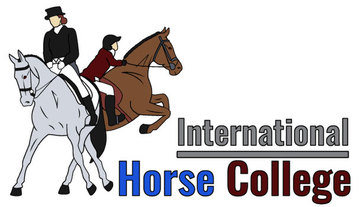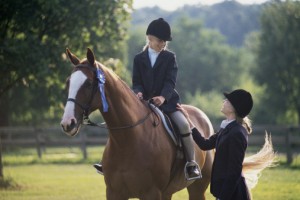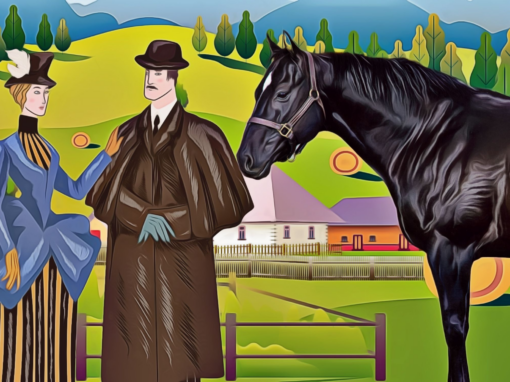 Equestrian Coaches Only!
Equestrian Coaches Only!
By Glenys Cox and Cristine Hall
Do you know what you are doing when you are coaching people with horses?
Take a moment to think about the last session that you coached.What happened? What did you learn from that experience? Do you take the time to reflect on how you teach your students in those lessons? Consider yourself a student as well. How do you learn from your coaching? And how can you be a better equestrian coach?
Reflective practice has long been recognised as an important phase ofexperiential learning. When John Dewey, philosopher of education, described the impact on learning from an experience, he claimed that the student’s capacity to reflect after an event (such as coaching your lesson!) was most important. This is true, particularly if what happened was well remembered, not what was expected, or was uncomfortable in some way. When you are more open to actively exploring the value of those lived experiences by reflecting,there is more chance of real growth and learning.
Luckily, most people who spend time with horses are open to learning as they choose activities in awell-suited environment. Connecting your experiences with horses to previous knowledge and testing what you already know in the light of a new experience is all part of your learning process. As the education theorist Donald Schon asserts, those who are encouraged to think carefully about what they are doing, either when they are doing it or soon after, are those who learn in a more profound way.
As a reflective equestrian coach, you may reflect in action, on action, for action or with action. Reflection can be an ongoing process! Reflection in action suggests anequestrian coach who is aware and mindful, constantly analysing the situation, and who engages in reflection and action simultaneously. Do you think on your feet (or seat!) and improvise as you go? Then you are most likely reflecting in action.
Reflection on action is looking back on previous actions by taking time to review those past experiences, by taking time to think and write down your thoughts. Do you take the time afterwards to think about significant events or instances you remember?
Talking about reflection on action …
Do you remember a few weeks ago that we sent an email on Teaching Styles for Equestrian Coaches? Did you take action and link through to the survey? Good for you! One of the benefits for completing the survey was that you took a moment to reflect on how you coach. If you did not complete the survey, go there now: Equestrian Coaching Styles. It may be helpful to you as a reflective exercise. You will also be contributing your voice to further research in coach education. As a further incentive, there is also a free gift!
In other forms, reflection for action suggests planning forward and selecting the most appropriate action for the future and reflection with action means actually taking those future actions. You may already use each of these forms of reflection in your coaching.
Take a moment to think about that.
All forms have the potential to enhance your ability for learning and teaching as a coach, to be a better coach for yourself and your students.
Reflective practice remains an important concept in sports coaching and that includes equestrian sports. Reflective practice is the key to learning from an experience; otherwise there may be little impact. There is value for you as an equestriancoach in knowing and understanding your own actions and the consequences of those actions.
Across all forms of reflective practice, your self-feedback can be focused on fixing problems or it can be more positive by reflecting on the successes and strengths of your experiences in coaching practice. One of the important aspects to consider when reflecting is to do what the education practitioner Tony Ghaye calls success-based or strength-based reflection. Reflecting on strengths or successes rather than what needs to be fixed may not only help you understand your own coaching but improve it going forward in the future. You may find that reflective practice contributes to increasing your level, skill and quality of coaching. Try it!
Reflective practices can help with four kinds of learning that are all regarded as important: affective (emotion), cognitive (thinking), positive action (mindset) and social (interacting). Affective learning uses feelings and emotions to learn, cognitive learning uses thinking skills and creative skills to think about things differently, positive action learning turns feelings into positive and strong action whilst retaining ethical and moral standards, and social learning is learning with and from others. It seems that not only is reflective practice important for coaches, it is also important for the students. Do you encourage your students to reflect on their experience of each lesson?
After completing the survey on Teaching Styles for Equestrian Coaches, consider asking yourself the following questions put together by Tony Ghaye. You can use these six questions as a guide to consider how you coach in your current coaching practice.
- What are the strengths and limitations of your current practice?
- What do you need to keep doing well?
- What are the things you need to change?
- What is the best way for you to move forward?
- How can you learn from success, no matter how small?
- What does the evidence of positive development look like, and how far is this evidence trustworthy?
It would be great to hear your feedback after you have taken the time to consider these questions in the Comment box below.If you have not done so, please complete the survey on Teaching Styles for Equestrian Coaches. Your comments on the survey or the articles are welcome and your contribution to ongoing research in coach education is greatly appreciated!
References
Dewey, J. (1997). Experience and education (First Touchstone Edition ed.). New York: Simon & Schuster.
Schon, D. A. (1987). Educating the reflective practitioner. San Fransisco: Jossey-Bass.
Ghaye, T. (2011). Teaching and Learning through reflective practice: A practical guide for positive action (2nd edition). Routledge New York NY
The survey is part of a larger study exploring teaching styles in equestrian sports coaching. For more information on the study contact: Cristine Hall, University of Southern Queensland, Australia Telephone: +61 7 4631 1405 Email: Cristine.hall@usq.edu.au
For the link to the previous article on Teaching Styles for Equestrian Coaches, go to (https://www.onlinehorsecollege.com/2013/05/teaching-styles-in-equestrian-coaching/).
For any issues with the conduct of the study contact: Ethics Co-ordinator, University of Southern Queensland, Australia Telephone: +61 7 4631 2690 Email: ethicsofficer@usq.edu.au USQ Ethics Clearance Document Number H12REA214
Please complete the survey on Teaching Styles for Equestrian Coaches (https://www.onlinehorsecollege.com/2013/05/teaching-styles-in-equestrian-coaching/).
Please add your comments below.












Reflective practice in action is a productive utilisation of time, it allows you to make the change required for improvement in the session opposed to continuing to try a method that isn’t working. I often ask myself and my students, “What is influencing the horse, how is my body physically and emotionally effecting the horse?”.
Dressage is the beautiful art of connection between horse and rider and requires a continues feedback loop (of receiving and understanding information).